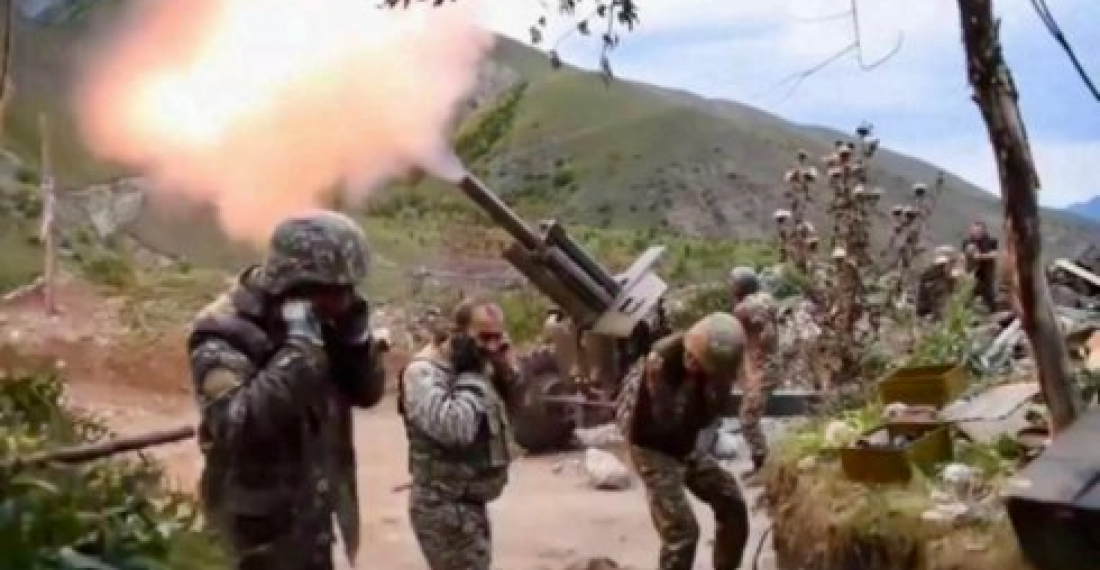Updated at 1500 CEST (1700 Baku/Yerevan)
Azerbaijan says it has taken Jabrail
Azerbaijan has said it has taken back control of the town of Jabrail and surrounding villages. The area is one of six districts of Azerbaijan around the territory of nagorno-Karabakh that have been under Armenian control since the fighting in 1992-94. The area is to the south of Nagorno-Karabakh and has been focus of very heavy fighting in the last few days.
_________________
Updated at 12 noon CEST (1400 Baku/Yerevan)
Harutyunyan says he has ordered the bombing of Ganca
The bombing this morning of Azerbaijan's second largest city has caused dismay, since it can lead to an escalation of an already tense crisis. The de facto president of the self-declared Nagorno-Karabakh Republic, Arayik Harutyunyan has now said that he ordered the bombing.
Many of you still remember both this photo & my statement. Reaffirming, we were not joking. Today I commanded to neutralize #Ganja military objects. pic.twitter.com/nzk7rR8kah
— Arayik Harutyunyan | Artsakh President (@Pres_Artsakh) October 4, 2020
Updated at 1040 CEST (1240 Baku/Yerevan)
The Azerbaijani government says the second largest city of Azerbaijan, Ganca has been hit with cluster munitions. It reports damage in civilian areas and casualties. The Armenian side are making the same accusations as regards the town of Stepanakert in Nagorno-Karabakh, which they say has been under heavy Azerbaijani aerial bombardment.
_____
Updated at 1020 CEST (1220 Baku/Yerevan)
The Armenian Ministry of Defence has denied that missiles have been fired from Armenia into Azerbaijan
.@ArmeniaMODTeam of the Republic of #Armenia officially states that no shots have been fired from the territory of the Republic of Armenia in the direction of #Azerbaijan.
— Government of Armenia (@armgov) October 4, 2020
________________
Armenian and Azerbaijani sources are now both saying that Armenia has bombed targets in Azerbaijan's second city Ganja.
If confirmed this would constitute a serious escalation of the current fighting that has largely been concentrated in the Nagorno-Karabakh conflict zone.
Shortly after 10.00 am local time (0800 CEST) the Azerbaijani Ministry of Defence issued a short statement saying that Ganja had been hit from Republic of Armenia territory. Later this claim was repeated by presidential aide, Hikmet Haciev, who said the city had been hit by rockets.
Shortly afterwards, Armenian sources confirmed the report. Armenia's semi-official Armenpress news agency carried a report citing the spokesperson of the president of the self-declared Nagorno-Karabakh Republic (NKR) in which he said, "The Ganja military airbase used by the Azeri forces to attack Artsakh's civilians has been completely destroyed". "The Ganja military airport is no more," he said.
The report also quoted the president of NKR, Arayik Harutyunyan saying "Despite numerous warnings, the Azerbaijani terrorist army continues targeting the peaceful population of Stepanakert with Polonez and Smerch systems. From now on the military facilities permanently deployed in Azerbaijan's major cities are legitimate targets of the Defense Army. I am calling on the Azerbaijani population to immediately leave these cities to avoid possible losses."
Earlier Armenian sources had been saying that the capital of NKR Stepanakert, was under Azerbaijani missile and artillary attack.
These developments constitute a serious escalation of the current crisis. Both sides are claiming civilian casualties, but the bombing of Azerbaijan's second largest city brings the conflict to a different dimension.
source: commonspace.eu with agencies







